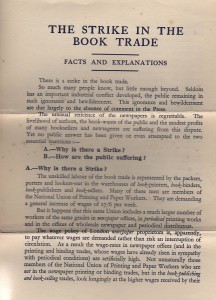 Everyone knows about the General Strike of 1926. It paralysed the nation for nine days and the serious damage it inflicted on the relations between employers and employees was never quite repaired. However, just a few months before the General Strike another strike took place that largely seems to have been written out of labour movement history. The Internet has little or anything to say about it and it doesn’t seem to have troubled historians. It was the Book Trade Strike of December 1925.
Everyone knows about the General Strike of 1926. It paralysed the nation for nine days and the serious damage it inflicted on the relations between employers and employees was never quite repaired. However, just a few months before the General Strike another strike took place that largely seems to have been written out of labour movement history. The Internet has little or anything to say about it and it doesn’t seem to have troubled historians. It was the Book Trade Strike of December 1925.
We at Jot HQ were unaware of the strike until a four page flier was discovered among a pile of papers. Entitled ‘The Strike in the Book Trade ‘and issued by the Book Trade Employers’ Federation on December 10th1925, it outlines the reasons for the strike, who were involved in it, the effects of it on the public, and possible remedies. The main arguments put forward by the employers’ Federation against the strike focussed on the privileged position of those unskilled workers in the book trade who were at the centre of the dispute—the ‘ packers, porters and lookers-out ‘—compared with other unskilled employees doing similar work in other branches of industry in London.
The figures supplied by the Federation to support their case are themselves revealing. Packers in the book trade were indeed paid better and worked fewer hours than the majority of their peers elsewhere in the metropolis, as this table of payment demonstrates:
Wage Age Hours
Packers in Drug and Chemical Trade 58/- 21 48
Packers in Co-operative Societies 60/- 24 48
Packers for London Employers’ 62/- 24 48
Association
Packers in Furniture Trade 62/1 21 47
Packers for Wholesale Textile Association 63/- 25 44
Packers in Cloth Trade 64/8 21 48
Packers for Export 64/8 21 48
Packers in Book Trade 65/- 21 44


